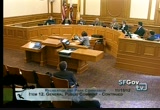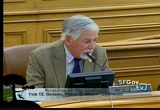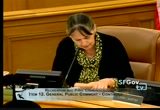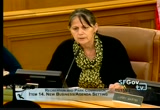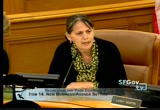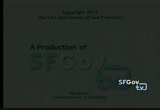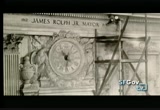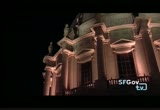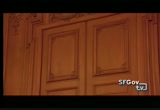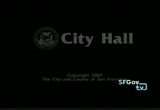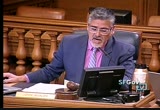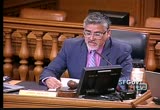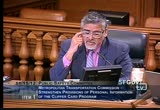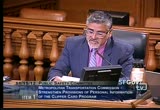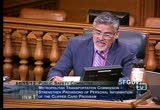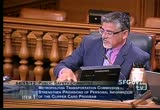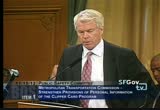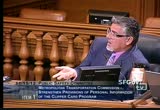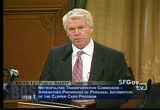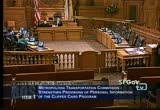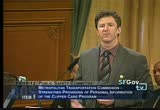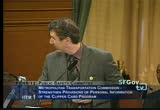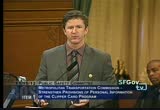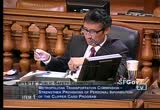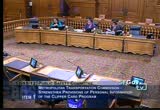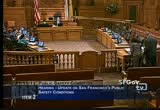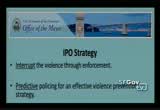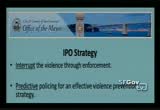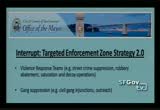tv [untitled] November 24, 2012 5:00pm-5:30pm PST
5:00 pm
address this issue. item 11 was pulled off the calendar because of a technical notification problem that staff at one length of term of the contract and it was going to be changed. i have been informed the nature of the business of bookings for this event, which is substantial and represents significant revenue to the department, the nature of that is such that the sooner outside lands people have guarantees of the terms of their contract the sooner they can book x. that addresses the quality of the production of the show they are going to do. so it seems very pressing to have this matter get as soon as possible through this commission and to the board of supervisors. it's been suggested and i'm
5:01 pm
in support of it that we try to put a special meeting together the week after thanksgiving. i would recommend thursday the 29th at 10 a.m. if that works for other commissioners. it shouldn't -- margaret you will have to know the availability of rooms, et cetera. >> yep. >> i put that on the table with the idea that i would like to -- i don't want to circumvent the public process but i want to try and get this done as fast as we can. 29th at 10:00. is there any compelling objection to this? with that, margaret, will you work on making that happen and work with the general manager on seeing if we can put that as a one-item meeting and make sure we get packets in sufficient time.
5:02 pm
>> we have everything. >> we do have everything, all right. so we have the packets in sufficient time. that is only other thing under item 13. >> is there anyone else? okay. is there any public comment under commissioner's matters? being none, public -- public comment is closed. item 14 is new business agenda. >> i'd like to add an item to that agenda, to this list of projects that we are kind of have been on hold. i would like to add that we agendize the stables at golden gate park. at some point in time that we -- when that item is agendized that we actually
5:03 pm
do get more information from staff what's happened from the point we stopped operating stables to now and what possibilities there are for resources for that project, if any. so it is an item that needs to come before us. whether we can do something with it or not, i think we still need to have some transparency about that. >> yeah. i agree, commissioner, that i think it is a discussion we should have. i personally would like to get a tour of the facilities that are out there and any other commissioner that wants to familiarize himself with it. because it seems that we have a permanent place on this agenda that it's talked about. whether we like it or not. so maybe we can like it a little more. >> i actually don't know
5:04 pm
where they are. i would like to -- >> yeah, we -- >> okay. >> and in fact, we did -- when i first came on as commissioner we did do a tour of the facilities. it was laid out what was going to go where, what was going to be done, some resources. possible resources there were. then it just -- then it was just dropped. this was some time ago. i think it would be good to have other commissioners go on the tour and, you know, kind of get brought up to date on what's happened with that project. >> okay. >> is there any public comment on this? being none, public comment is closed. communications? is there any public comment? being none, public comment
5:05 pm
is closed. 16 is adjournment. >> all in favor in favor. aye, aye, aye. thank you, it's done. >> i have 2 job titles. i'm manager of the tour program as well as i am the historyian of city hall. this building is multifaceted to say the very least it's a municipal building that operates the city and county of san francisco. this building was a dream that
5:06 pm
became a reality of a man by the name of james junior elected mayor of san francisco in 1912. he didn't have a city hall because it was destroyed in the earth wake of 1906. construction began in april of 1913. in december 1915, the building was complete. it opened it's doors in january 1916. >> it's a wonderful experience to come to a building built like this. the building is built as a palace. not for a king or queen. it's built for all people. this building is beautiful art.
5:07 pm
those are architecture at the time when city hall was built, san francisco had an enormous french population. therefore building a palace in the art tradition is not unusual. >> jimmie was an incredible individual he knew that san francisco had to regain it's place in the world. he decided to have the tallest dome built in the united states. it's now stands 307 feet 6 inches from the ground 40 feet taller than the united states capital. >> you could spend days going around the building and finding something new. the embellishment, the carvings,
5:08 pm
it represents commerce, navigation, all of the things that san francisco is famous for. >> the wood you see in the board of supervisor's chambers is oak and all hand carved on site. interesting thing about the oak is there isn't anymore in the entire world. the floors in china was cleard and never replanted. if you look up at the seceiling you would believe that's hand kof carved out of wood and it is a cast plaster sealing and the only spanish design in an arts
5:09 pm
building. there are no records about how many people worked on this building. the workman who worked on this building did not all speak the same language. and what happened was the person working next to the other person respected a skill a skill that was so wonderful that we have this masterpiece to show the world today.. >> good morning andy welcome to the public safety meeting of the board of supervisors. my name is supervisor john avalos, joined to my right by the vice chair, supervisor olague and
5:10 pm
supervisor eric mar. the clerk today is erica davis. >> please make sure to silence all cell phones and electronic devices, completed speaker cards and copies of any documents to be included in the file should be submitted to the clerk. items acted upon today will occur on the december 4 board of supervisors agenda unless otherwise stated. >> i want to recognize the sfgtv staff working on this committee. madam clerk, could you please call item 1. >> item no. 1, resolution urging the metropolitan transportation commission of the state legislature to strengthen the privacy provisions of personal information of the clipper card program. >> thank you, madam clerk. this is an item that i have called forward and i want to thank my co-sponsors, supervisor chiu and supervisor olague, my committee members,
5:11 pm
for their co-sponsorship. this resolution has come out of recent media reports of the grave concerns about the clipper card privacy policy. after reviewing this issue further and discussing it with staff on the mtc, i am encouraged they want to make the clipper card privacy policy as strong as possible. the clipper card privacy policy gives the mtc the right to maintain all personal information indefinitely for active clipper accounts and for up to 7 years after accounts are closed or terminated. i am encouraged the mtc is taking steps to address these issues on their own. i hope this will assure the public the mtc is taking steps to protect their privacy. it is more stringent than cell phone plans which allow cell phone companies to
5:12 pm
sell their information, which is not the case. most of us are carrying around smart phones which are far more effective at tracking our every move than clipper cards. a recently designed smart phone application allows the phone to scan the clipper card and transmit information. it can be used without the clipper card's user's knowledge or permission. people can protect themselves from this by storing their clipper cards in a bag or somewhere, where it would be difficult for someone else to place a smart phone within a few inches of the card thus perhaps getting that information. the resolution addresses this issue. with the resolution, and i have an amendment of the whole that i have passed on to the clerk, it actually includes amendments that have been proposed by the mtc, we
5:13 pm
definitely wanted to work with the mtc on their concerns about moving forward with the new resolution and so the new resolution reflects those proposed amendments and they include a way to determine what the minimum duration of time is that -- excuse me -- it will request that the mtc provide a minimum duration of time that they will maintain clipper users' transit history and personal information and revise their privacy policy in time. the mtc agrees they shouldn't need to keep this information for 7 years after the account is closed and they will be reducing that amount of time in the future. they have agreed to do that. they will also explore the feasibility of minimizing the data stored on clipper cards encrypting the data or providing the ability for users to clear the data. they also
5:14 pm
will agree and the resolution requests that the mtc provide faq's, frequently asked questions and information regarding those questions on a web site that clipper card users can access that will explain the privacy policy and how the clipper cards are used. it also creates an annual transparency report that publishes the number of requests for information from law enforcement and other groups and the percentage of those requests that actually were granted. so that would also be information that will be shared with other agencies and with the public so that if law enforcement agencies want to gather fotion, gt -- information, that will be shared the number of times that happens over the year. that was something that was a big concern for the mtc so we removed that language and really feel that the mtc has
5:15 pm
been working well with us and with other stake holders to assure that there are actual new plans in place for how the privacy policy will be implemented and i want to thank the mtc in particular randy renschler, who is here, for your work on that. colleagues, if you have -- if there are comments or questions? i had originally thought that this resolution could go for adoption without committee reference but since we're talking about transparency and privacy policies it makes sense that we bring it to our committee in full disclosure. so let's open this item up for public comment. we do have mr. renschler here from the mtc and if you would like to share with us your thoughts about the resolution and our process. >> thank you, supervisor avalos and also thank you to your able staff, jeremy, for working with us. we appreciate
5:16 pm
the changes you have made in the resolution. i just want to assure everyone that's here that we take privacy very seriously both on the clipper card and on fast track that we also operate at the commission and your attention to it kind of keeps us honest, too. we're not perfect, we need to review these things. you have a lot of good suggestions that we're certainly going it take under consideration. one specific outcome in this subject is the commission is expected to get some recommendations with us with respect to how long we keep information on closed accounts. it was set many years ago probably on business and financial reasons, not really thinking about the privacy part, so we're certainly going to bring that back to the commission as a direct result of your interest in this subject and you have a lot of other good suggestions here as well. i can answer specific questions about why clipper works the way it does with respect to the information we keep on the card, the transactions, which mostly have to do with the fact we want to give people the discounts they are due as a result of
5:17 pm
different transit offers and transfers and so on. i just want to thank your staff for working with us on this resolution. >> thank you, i appreciate your work with jeremy pollock in my office. i guess i have one big question and that is like 3 clipper cards myself. i purchase them with a commuter benefit check at walgreen's, i don't know if anyone really knows they actually belong to me. i also have a commuter benefit visa card that i am able to purchase clipper cards at vendor sites at bart stations. i'm not sure there's actually, besides linking that clipper card to my visa card whether there's actual understanding that i am the owner of that clipper card. so how many people actually is the program able to identify a particular card with a
5:18 pm
particular person? >> so this is a clipper card here. the information on this card is essentially the serial number of the card and it has your last 10 transactions on it so if you used it to ride bart or used it to ride muni, the last 10 are on there. in order to calculate your discounts if you need them, other than that, there's no information on the card other than, again, the loading in the pass -- so if you put $10 on it or put a fare on it, it has that. but your personal information is separate and is at a customer service center that is far away and not linked to your card. no one can get anything from your card even if these devices which are being introduced scan it. your information resides in a customer center station. so the customer service which is
5:19 pm
privately contracted out, is really the only place where a connection is made to you as a person and almost -- only as a result of your request. >> okay. thank you. if there are no other comments or questions we will go on to public comment. any member of the public who would like to comment, please come forward. >> thank you, members of the board, my name is chris connelly. part of our mission is to make sure that as new technology comes along that people don't have to choose between using the new technology and keeping their privacy. we are pleased to hear that mtc is taking action that clipper action, although
5:20 pm
not as precise as information from a cell phone, can reveal a lot about a individual. it can reveal if you got on or off bart near a hospital, near a clinic, all sorts of things that may imply things about your personal life and particularly over a long period of time there is an extensive amount of information collected about a person. are they going to church on a regular basis. are they going to baseball games when they are supposed to be at work? i think it is important to recognize that these records should be respected, should be treated as private information and as the commission said, should be looked at and retained only as long as necessary for operational purposes, not because it's cheap to retain data but because you need them
5:21 pm
for fraud. i'd like to demonstrate to the committee, this is an application for an android app >> what is it called again? fare bot it requires a new android phone that has an (inaudible) all you need to do with the app, attach it to a card, the balance available on the card, recent trips, i believe it's actually 15 recent
5:22 pm
transactions rather than 10 if you count these up, and it is no time limit so it may be 15 in the last week or 15 in the last number of months or even years potentially, when the card has been refilled and it also records information about the identity, the serial number about the card and a few other technical details. this can reveal a little bit of information about a person in a single read, but notably it can be used repeatedly and because it reads the serial number, you can record the same person, see if it's the same card. you can use it on a smart card to track your partner or your child or your parent or anyone's card you have access to on a regular basis, you can obtain information about their comings and goings. technologically it's possible to build a better reader than on a smart phone. i'm not sure of the distance but it would not require contact with the cards under a stronger radio technology to
5:23 pm
receive signals and receive signals from the card. this is something i hope the information will address, the fact it's not encrypted in any way so anyone with a phone can read not only their own clipper card but anyone's clipper card and finding ways to make sure that information is secure. finally i'd like to endorse what you have added to this, which is the transparency provision here, which is to require the mtc to report every year on how many requests it receives for information and how it handles those requests. as we know there is a great deal of interest from many parties, law enforcement, civil litigants and others about location information and other information about individuals. we need to have transparency about how often this information is being shared in order to have an informed dialogue with you, with the commission, with the public and our legislators about how to handle this information, and information about whether those requests are complied with.
5:24 pm
thank you very much. >> thank you, i think that's the strongest part of the resolution. supervisor mar. >> i want to thank the aclu for raising concerns about the privacy concerns. i am surprised about how much information from an app you can get. supervisor avalos and i were chatting a little bit, my 12-year-old using her clipper card quite a bit. i am curious whether she goes where she says she is but i understand the privacy concerns especially within the mta to be more transparent so i am really appreciative of the legislation and i'd like to ask if i could be added as a co-sponsor as well. >> great. it's important to say that the resolution references that it's really bart and the material that bart's able to put on their clipper card that actually does
5:25 pm
the tracking, but in the end within the mta you really can track where someone has been within the mta system of san francisco so that might not help you with your daughter. okay, we will close public comment and we actually have a member of the whole, we can take that, colleagues, i don't have a copy, eric, do you have a copy of that? so we can take that, colleagues, without objection, member of the whole? and we can send the item forward with recommendation? okay, good. let's call our next item, please. >> item no. 2, hearing to receive a briefing on san francisco's public safety conditions from the san francisco police department and mayor's office of criminal justice. >> great, thank you, madam clerk. i called this item, we haven't had an update in a number of months from our department,
5:26 pm
public safety department, about how we are doing as a city in terms of responding to crime in our city. so we have jason elliot who is here to start off the presentation. >> thank you, mr. chair, jason elliot from the mayor's office. i will be very brief. thank you for calling this hearing and continuing to pay attention to this issue, it's a topic of constant conversation in meetings in the mayor's office. what we're going to present to you today is a condensed version in the interest of time, an overview of the mayor's new ipo interrupt, predict and organize strategy to fight crime. this was a strategy that was developed and implemented in july, it's now november so we have begun to see fruits of that labor. so we will provide a brief update there and then commander murphy from sfpd will respond to the other part of the hearing request, which is for actual crime trends and hard data. so without further ado and now that i'm thoroughly terrified
5:27 pm
of what my clipper card information is contained on there, let me turn it over to the mayor's director of public safety, paul anderson. >> mr. anderson, welcome. >> good to see you again. with that introduction we have a little slide show here with the information. basically here is our strategy and all of these things are kind of interrelated so they all fold into each other, but interrupt, predict and organize are basically how we have structured what this new approach is. that's kind of the innovative aspect of it. basically it's broken down like this. the interrupt like this is interrupting the violence through enforcement. the predictive component is predictive policing for more effective prevention strategy and the organizing, social service agencies, enforcement
5:28 pm
agencies, faith based organizations, business to work collaborative kind of the thing you see in the community and on the streets. so it's kind of a new partnership that we've built and that's that innovative component that we put into the strategy. i'm going to just talk a little bit about both myself and deanna, who is going to get up in a moment and the police department is going to get up in a moment. i focused really primarily on the i and the p, which is interrupt and predict, so i want to give an overview of what that is and how it works so you have a better understanding of what we're doing. so the interrupt part, which is also an introduction of the new zone strategy within the police department, includes the following: does this roll up? you guys have it in front of you. the violence response teams,
5:29 pm
the vrt's, it includes gay suppression efforts, violence cease fires, all of our gun abatement programs collectively and our yuelgt and family programs which also dovetails into the organizing component. a lot of these things may look familiar to you because some of them are existing resources that were already in place. the innovative component or the innovative approach is figuring out what the best practices were in making sure they were all inder linked in new ways of both accountability and starting from the top from a senior level with the chiefs and the heads making sure there's information to share. i think to put a framework on it so it's this context for all of you, some of the new things we're dealing with are the prcf results that have come out as a
109 Views
IN COLLECTIONS
SFGTV: San Francisco Government Television Television Archive
Television Archive  Television Archive News Search Service
Television Archive News Search Service 
Uploaded by TV Archive on

 Live Music Archive
Live Music Archive Librivox Free Audio
Librivox Free Audio Metropolitan Museum
Metropolitan Museum Cleveland Museum of Art
Cleveland Museum of Art Internet Arcade
Internet Arcade Console Living Room
Console Living Room Books to Borrow
Books to Borrow Open Library
Open Library TV News
TV News Understanding 9/11
Understanding 9/11